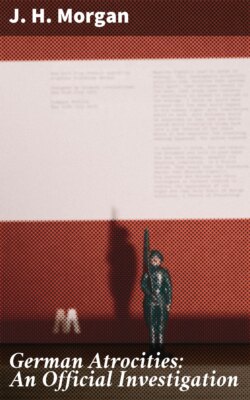Читать книгу German Atrocities: An Official Investigation - J. H. Morgan - Страница 22
На сайте Литреса книга снята с продажи.
The German Diaries.
ОглавлениеI have allowed the German White Book to speak for itself. It is a well-known rule of law that a party is “estopped” from denying his own admissions, and the incriminating character of these admissions is, as we have seen, conclusive against the German Government. Had I desired, I could have reinforced it by other evidence, also emanating from German sources, in the shape of Proclamations and diaries (of which I have seen some hundreds at the Ministry of War in Paris), which amply corroborate the conclusions already arrived at. The German pretence of a judicial inquiry into the guilt or innocence of the victims of their sanguinary fury is refuted by the simple fact that their own Proclamations frankly intimate that the principle of decimation and of vicarious punishment will be adopted, in the case of infractions, whether real or assumed, of what they choose to call their commands. A hostage may fail to turn up as a substitute, an inhabitant may be found with a litre of benzol unaccounted for, another may dig potatoes in the field, yet another may fail to salute or to hold his hands up with sufficient promptitude—and the penalty decreed is invariably the same: he, or a substitute, will be shot—“the innocent will suffer with the guilty.”41 Not only so, but as a rule no attempt was made to discover whether any offence had been committed or not. In the diary of a German officer which came into my possession an entry recording the undiscriminating butchery of some two hundred civilians concluded with the otiose remark: “In future there ought to be an inquiry into their guilt instead of shooting them.” An unpublished Proclamation in my possession, which was handed to me by the maire of a town now in our occupation, declared that the civils, “ou peutêtre les militaires en civil,” had fired on the troops; the parenthesis damns its authors beyond redemption. And when all other tests fail, when every international convention has been repudiated, there still remains the elementary rule, which not only jurists but soldiers have always emphasized, that in reprisals and retribution there should always be some proportion between the offence and its punishment. What then is to be thought of the admission of a German soldier that sixty villagers, including women in travail, were shot “because,” he adds laconically, “they had telephoned to the enemy”? The critic who carefully collates the diaries, published and unpublished, will find overwhelming evidence of indiscriminate and lawless butchery—“Befehl ergangen sämtliche männliche Personen zu erschiessen.... Ein schrecklicher Sonntag” (Order passed to shoot all the male inhabitants.... A frightful Sunday); “Ein schreckliches Blutbad” (A frightful blood-bath); “Sämtliche Rechtsnormen sind aufgelöst” (All the rules of law are cast to the winds). And nothing is more instructive than to observe how each lays the blame for the worst outrages upon the other, while incidentally admitting those of his own unit. One says, “It’s the infantry who are to blame”; another says, “The pioneers are the worst and those brigands of artillerymen”; a third writes, “It’s all the fault of the transport.” The cumulative effect of these recriminations is to inculpate the whole.42
